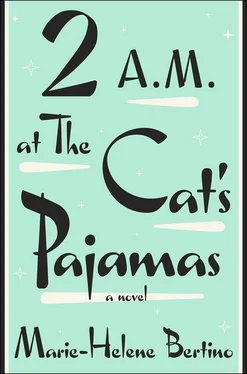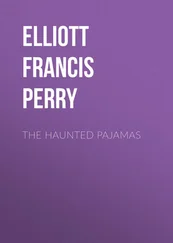“What is it?” she says.
One of his buddies holds up a camera. “He’s getting married tomorrow. Take our picture!”
She accepts the camera. Up close, she is cuter than Greg Michaelman thought.
“You.” She points to Rodriguez. “Scootch in. Act like you like each other.”
Greg feels the bodies of his friends on either side of him. He has been through school and mud with these boys. There is no town better than his college town, so he never strayed. He has eaten breakfast at all of their kitchen counters. He has watched countless games on countless televisions. He has not always been kind. He didn’t show up for Ollie’s dad’s funeral and he ignored Rodriguez’s phone calls after he was laid off. He hasn’t exactly comforted Allison when she’s griped about her weight. He would like her to lose the handful of flesh that hangs over her underwear’s waistband. A flash. The girl takes the picture and Greg Michaelman is certain about one thing: he is going to make Allison Cady happy for the rest of her life.
Sarina hands the camera back to the one with the open shirt, ignores his requests for her number as she walks away. One of them grabs her waist with a rough grip. “Take another one,” he commands. “In case that one’s not good.”
“It’s fine,” she says. “I checked.”
“Don’t be a bitch,” the groom says.
Sarina takes the camera back. Obediently, they cozy next to each other on the leather couch. “Smile.” They oblige. “That’s all?” She frowns. “You don’t want to get closer? Get closer,” she barks. They titter. One of them grabs another’s breast, joking. “That’s it,” she says. “This guy has it.”
More tittering. The groom puts his arm around the guys flanking him.
“That’s nice,” Sarina says, “but why don’t you make out? You’re so close, you may as well. Tongue looks great in pictures. Take your shirts off.”
Their grins fade. They exchange glances.
Sarina keeps snapping pictures. “You cowards. Grab each other’s cocks and let’s go. Jerk each other off so this is worth my while. What I’m looking at is a bunch of worthless pussies and I wanna see cock.”
Ben stands behind her. “You all right?” he says.
The groomsmen jockey away from one another. “Aw, is that all you’ve got?” Sarina chucks the camera into the group. “Show’s over, I guess.” She says to Ben, “Shall we go?”
“Sure,” Ben stammers.
They confirm the buttons and zippers of their coats, replace their hats and gloves, and leave the bar. Cabs clog the street. A sharp honk. Sarina walks ahead.
“You want to talk about that?” Ben says, trailing her.
She blinks. “Talk about what?”
Madeleine wakes, palms and armpits damp. For a moment she does not remember the events of the day. When she does she rolls over to burrow deeper into the blankets. Her forehead flattens against the spine of a book.
History of Jazz, Volume Two .
Madeleine clutches it to her chest. Her father! She touches each picture on the cover. A phalanx of saxes. Louis Armstrong, cheeks blazing. Billie Holiday, in the ecstasy before singing. Madeleine flips each page with the care of a scientist. Toward the back she finds the write-up on The Cat’s Pajamas with two (two!) pictures. She forces herself to read the entry before allowing herself a look at the pictures.
The Cat’s Pajamas is a squat outcropping on Richmond Street in the city’s Fishtown neighborhood. It was founded by Giuseppe Lorca in 1963, who passed it down to his son, Francis Lorca, under whose ownership it became a magnet for world-class acts. At one time it was the #1 jazz venue on the East Coast, hosting the likes of John Coltrane, Hampton Hawes, Bud Powell, and Horace Silver, who called the club, “My second womb, the only place to build chops.” Francis Lorca ran The Cat’s Pajamas until suffering a stroke during a late-night hang, literally passing away behind the bar. He willed the club to his son, Jack. In recent days, as jazz’s popularity dwindles, The Cat’s Pajamas does not attract anywhere near the numbers of its heyday, though nearby jazz club Mongoose’s (see pages 156–159) continues to thrive .
In a black-and-white photograph a man holds up a guitar like a prized marlin. Francis Lorca owned one of the only known D’Angelico Snakeheads , the caption reads. In the other photo, a woman sits at a piano, a silky black braid hanging down her back. Every night in the 1990s Valentine Morris, a girl from the neighborhood, led a raucous hang until the wee hours of dawn .
Madeleine covers and uncovers the woman’s face with her fingertip. Valentine grins, gums showing over perfect teeth, stomping on the pedals. Madeleine can hear the jangle of this woman’s laugh. She feels the faultless ivory keys, the pat of her feet on the pedals.
“A local girl,” Madeleine recites. “… named Valentine Morris.” She presses her cheek against the book’s centerfold, a boozy picture of the New York skyline.
She hears scratching at the front door. She opens it and Pedro saunters in, looking bored, unaffected by the panic he has caused. He circles around himself and falls asleep on the rug.
Through the cavities of a demolished house, Ben and Sarina can see the first few trees of Fairmount Park. A mutter of bushes.
“Does that park make you sad?” Ben says. “It makes me sad.”
“It’s just a park,” says Sarina.
“Ornery,” Ben says, “is what I would call it. Better-him-than-me kind of park. I’d bet even the animals who live in it are defensive and mean. Grumpy foxes. Depressive robins.”
“Owls that are always talking about themselves,” Sarina says. “Without ever asking about you.”
“Put a sock in it, owl,” Ben says.
Sarina’s mother calls: Sarina!
“Should we go in?” he says. “Or, shall we continue our tour of the city’s fountains?”
“Pardon?” Sarina says.
With a sweep of his hand, Ben showcases the city. “Our tour …”
“Sarina!” her mother yells. “He’ll be here any minute!”
“I’ll be right down!” Sarina bows her head in prayer. She is twenty years younger and standing in front of her bedroom mirror. She wears her grandmother’s dress, whisper-soft and yellow.
Ben, twenty years younger, races his older brother Jeff’s ’65 Mustang up the road to Sarina’s house. He was allowed to borrow the car only after promising to uphold several conditions spelled out while Jeff clutched his wrist so tightly the veins protruded. He will not punch the brakes, he will not throttle the gears, he will not drive over sixty-five miles per hour.
He has it up to eighty-five, gut in throat, suit jacket folded on the rumble seat beside him, underneath a yellow wrist corsage his mother picked out. Houses flash by. The meadow that borders the road is gold in grain. Perspiration coats the back of his neck. He fumbles for napkins in the glove compartment and applies them to his neck, taking each corner slowly, all windows down, so he is dry when he reaches her house.
He parks, gets out, and tucks in his shirt using the window as a mirror. He is halfway up the driveway when he realizes he forgot the corsage. He runs back to the car. He has almost reached her house again when he decides he should wear the suit jacket. Back to the car.
Sarina’s mother and sister sit on the window seat, drinking tea. They watch the boy return to his car for the second time.
“The corsage,” her mother said, on the first go-back.
“What is it now,” her sister says, on the second. “Oh, the suit jacket.”
Sarina’s mother made the teacups out of found glass. She made the window seat’s cushions from discarded fabric she found in a neighbor’s trash. Her mother sees all objects in the world in two ways simultaneously: what they are and what they could be. She never gives up on anything, simply repurposes it. She had tailored her own mother’s dress to fit Sarina’s petite shape, happy that her daughter wanted to go to her prom and wear something other than black.
Читать дальше












